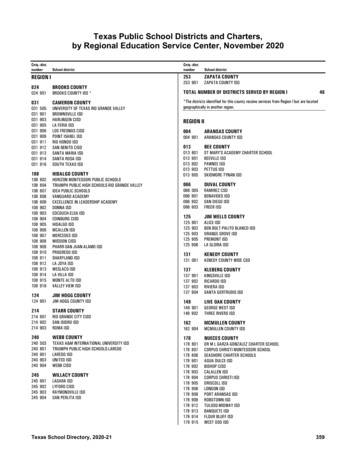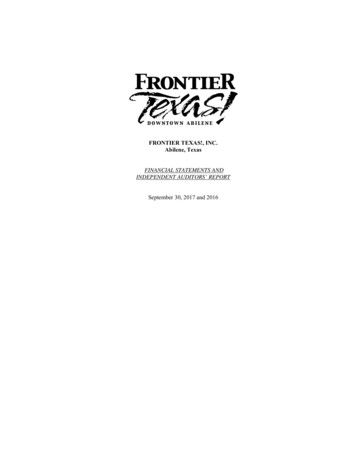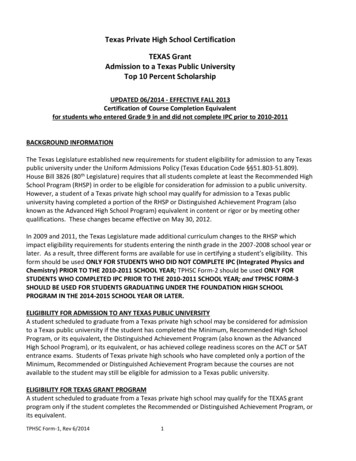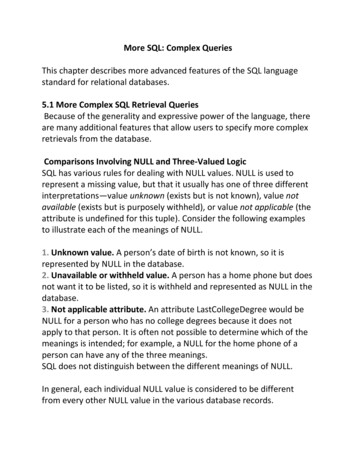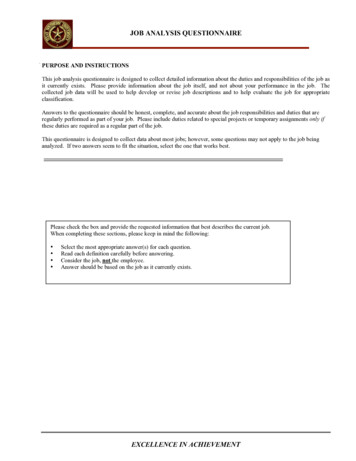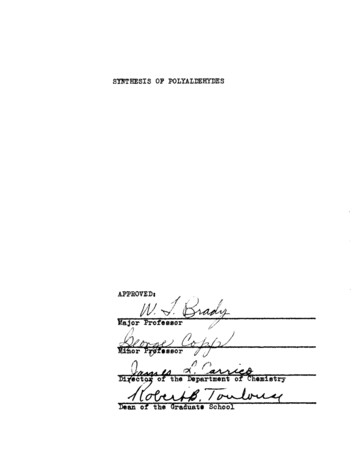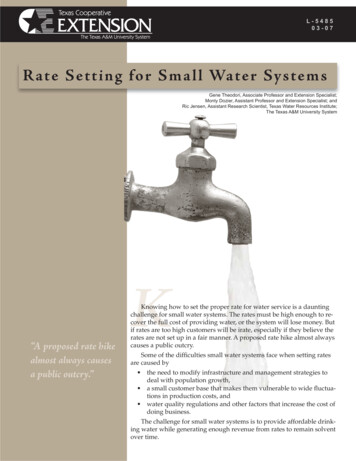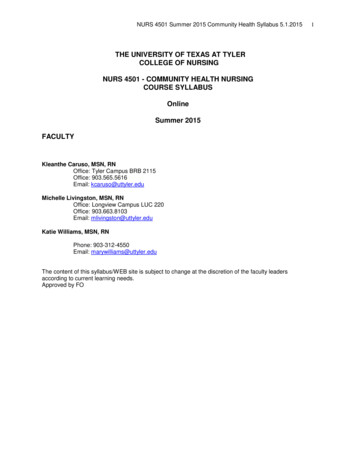
Transcription
NURS 4501 Summer 2015 Community Health Syllabus 5.1.2015THE UNIVERSITY OF TEXAS AT TYLERCOLLEGE OF NURSINGNURS 4501 - COMMUNITY HEALTH NURSINGCOURSE SYLLABUSOnlineSummer 2015FACULTYKleanthe Caruso, MSN, RNOffice: Tyler Campus BRB 2115Office: 903.565.5616Email: kcaruso@uttyler.eduMichelle Livingston, MSN, RNOffice: Longview Campus LUC 220Office: 903.663.8103Email: mlivingston@uttyler.eduKatie Williams, MSN, RNPhone: 903-312-4550Email: marywilliams@uttyler.eduThe content of this syllabus/WEB site is subject to change at the discretion of the faculty leadersaccording to current learning needs.Approved by FO1
NURS 4501 Summer 2015 Community Health Syllabus 5.1.2015TITLENURS 4501-Community Health NursingSEMESTER CREDIT HOURS5 Hours (2 hours didactic, 3 hours clinical).PREREQUISITESSuccessful completion of all courses through Semester III for generic and LVNstudents.COURSE DESCRIPTIONThis course introduces concepts of community health utilizing the population focusednursing process. Emphasis is on health promotion, risk reduction, and diseasemanagement in selected community settings.STUDENT LEARNING OUTCOMES Integrate principles of public health science at local, national, and global levels. Demonstrate ability to coordinate and plan quality nursing interventions forcommunities based on population focused nursing process. Synthesize research findings from multiple disciplines to facilitate and evaluateevidenced-based practice in the community. Utilize technology to analyze public healthcare delivery systems to improvepopulation health outcomes. Discuss basic knowledge of healthcare policy, finance, and regulatoryenvironments that affect the health of diverse populations. Plan comprehensive nursing care that reflects human caring for diversepopulations through multidisciplinary collaborations Differentiate the levels of prevention to improve health outcomes of diversepopulations Identify historical and ethical values of community health nursing.Required Text Nursing 4501 Course Syllabus. Stanhope, M., & Lancaster, J. (2014). Foundations of Nursing in theCommunity: Community-Oriented Practice. St. Louis: Mosby.ISBN: 978-0-3231-8899-9Evaluation of Learning StatementStudent learning outcomes from the didactic portion of the course will be evaluated byfour exams, a public service announcement project, and class participation in other2
NURS 4501 Summer 2015 Community Health Syllabus 5.1.2015assignments. Exam blueprints will be posted prior to each exam. All exams will betaken online in the computer lab on campus.Student learning outcomes from the clinical portion of the course will be based onstudent engagement during the clinical rotation and may include clinical agencyplacements and group work as it relates to community health nursing.Grading PolicyStudents will have course grades calculated based on the weighted calculation ofexams and other required course work. The weighted calculation must be 75% orabove to pass the course.1.Course Grade Calculation:Public Service AnnouncementEvidence Based Research AssignmentsOther Assignments (quizzes, class activities, case studies, journals, etc.)MidtermFinal Exam10%15%20%25%30%Total: 100%Clinical Masterypass/fail2. Final course grades will be assigned according to the following scale: (anaverage of 74.5 – 74.9 will not be rounded to 75).A90-100B80-89C75-79D60-74F60 and belowI will make every effort to respond quickly to your emails. Generally, speaking, I checkmy email inbox several times a day during the week and less frequently on theweekend. When you send me an email, I will respond within 24 hours during the weekand 48 hours on the weekend (excluding holidays).In grading your assignments, I will have them back to you with feedback in one weekfrom the due date or your submission date, whichever is later.3
NURS 4501 Summer 2015 Community Health Syllabus 5.1.20154Public Service Announcement You will choose a public health issue specific to apopulation and create a public service announcement with your group. You willcollaborate and work together with members of your group (must have at least 4people) to produce a 2-3 minute public service announcement. The video must becompleted, edited, and in a format that can be shown to the instructor by the due datelisted in the course calendar. The public service announcement will be evaluated usingthe rubric located on Blackboard.Video equipment can be checked out from the Educational Technology ServicesDepartment located in LIB 128. The telephone number 903-566-7138 and the websiteis http://www.uttyler.edu/etsOther Assignments This will be determined on each campus. This grade will derivefrom participation in online class activities. Assignments for this part of your grademay not be made up.Examinations/Assignments and Grading PoliciesCompletion of Nurs 4501 is based on satisfactory attainment of didactic and clinicalcriteria. Any student who fails to meet the course objectives and expectations in eitherthe classroom or clinical area must repeat the entire course and may not progress tothe next level.Examination and Examination Review Policy1. Attendance for exams is mandatory.2. If absence for an exam is necessary, the student is responsible for notifying thefaculty prior to the exam. Make-up exams will only be given at the discretion of thefaculty member and may be in a different format than the original exam. Failure tonotify the course faculty of the need to take the exam on an alternate date will resultin a grade of zero for that particular exam.3. Exams will be made available at the time the exam is scheduled to begin. Studentswill be allowed to enter the computer lab after an exam has been started ONLY withfaculty discretion.4. Silence will be enforced during the exam time. In order to avoid distraction duringthe exam, no one will be permitted to leave the room until testing is completed.5. Test review may be scheduled with the faculty during office hours and within 10school days from the return of the exam grades.6. Any student achieving an examination grade less than 75% must schedule anappointment with the faculty within 10 school days from the return of the examgrades.Paper/Assignment Re-grading PolicyStudent assignments will not be re-graded. At the instructor’s discretion, a draft may bewritten for review.Academic Integrity1. Students are expected to assume full responsibility for the content and integrityof all academic work submitted as homework and examinations.
NURS 4501 Summer 2015 Community Health Syllabus 5.1.201552. Students are advised to review the Scholastic Conduct and Discipline Policy inthe current College of Nursing (CON) Guide for Baccalaureate Students and UTTyler Academic Dishonesty Policy and Academic Integrity Policy for UT Tylerstudents at www.uttyler.edu; click on current students, then Vice-President forStudent Affairs, then Student Guide for Conduct and Discipline at UT Tyler.These policies are fully endorsed and enforced by all faculty members within theCollege of Nursing.3. Plagiarism, cheating, and collusion are unacceptable and if found violating any ofthese standards the student will be disciplined accordingly (See BSN/MSNNursing Student Guide for definitions).4. The College of Nursing reserves the right to dismiss students from the programfor any infraction of a legal, moral, social, or safety nature, pursuant to theprocedures detailed in the Regent’s Rules.NOTE: The following is an excerpt from the University’s Honor Code that appliesto ALL individuals who are associated with The University of Texas at Tyler:The UT Tyler community joins together to embrace:Honor and integrity that will not allow me to lie, cheat, or steal,nor to accept the actions of those who do.Course Information:1. If lecture outlines are used, they will be posted on Blackboard a minimum of two(2) days prior to class.2. The clinical portion of the course syllabus, handouts/outlines, and any otherrequired course materials will be placed on blackboard.3. All submitted written material (papers, assignments, examinations, etc.) are theproperty of the College of Nursing. They will be maintained in an archived file inthe College of Nursing.4. The BSN/MSN Nursing Student Guide is available on the CON website. Thestudent must sign the statement indicating they have accessed the Guide andreturn the signed affirmation form to the program secretary for placement in thestudent file. (Responsibility of Level 1 faculty)5. Submitting NCLEX questions each week is required. Questions will be turnedinto your clinical faculty member while you are in your Community Health clinicalrotation. Clinical instructors will collect questions weekly.6. You are required to participate in ATI testing.7. All nursing students are required to use their student email accounts for allcorrespondence (Approved FO: 2/03).Student Affirmation Form and Social Networking Policy (Blackboard Assignment)1. Each line must be initialed, signed, and dated for each course every semester.2. Must be completed by the first day of class and submitted electronically.
NURS 4501 Summer 2015 Community Health Syllabus 5.1.20156Course ExpectationsAttendance1. Attendance during lab and clinical experiences is a professional expectation and willbe monitored by course faculty. Attendance for clinical assignments is addressed atlength in the syllabus. Refer to the university catalog for the policy regarding studentattendance and possible student consequences.2. Professional behaviors (verbal & nonverbal communication, dress & appearance,cultural sensitivity, etc.) are expected at all times during the CHN experience.Completion Time1. You should expect to spend as much time on an online course as you do in a faceto-face course. As a rough guide, you should plan to spend four to six hours perweek on the theory part of this course. The actual amount of time will vary fromindividual to individual. This estimate includes the time you spend in reading,discussions, and assignments.2. You will have access to one module of material at a time. The module will consist ofthe learning materials and activities for the week and will remain up through the endof the course. All assignments have set due dates. Unless noted differently, duedates are as of 5:00 PM Central Standard Time on that date.Class ConductAll students will maintain respect and courtesy for their classmates and for theinstructors. Do not use pagers, cell phones, communicators, or other disruptivecommunication devices during class. Turn off all such devices before class begins. Noprofanity, lewd, rude, or socially unacceptable behavior will be tolerated. If studentconduct becomes unacceptable, the instructor will ask the student to leavelecture and not return. Discussion board forums and email are considered partof the classroom and should be professional at all times.Student Dress Code for the University of Texas, College of Nursing General:Undergraduate Clinical Dress Requirements:General: It is the philosophy of the College of Nursing that the student has aresponsibility to be neatly groomed and modestly dressed. Appearances shouldpromote good health, safety and general well-being of the student. Clothing shouldavoid brevity and/or design that are offensive to the dignity and rights of others. Schoolofficials have the right and responsibility to counsel with the student or take any othercorrective action. Types of clothing (other than those specified in this document) maybe worn at the direction of the nursing instructor for special events.Classroom: Casual or everyday business wear is recommended. This includes but isnot limited to the following: slacks or skirt; sweater, blouse, and shirt. Jeans as well as
NURS 4501 Summer 2015 Community Health Syllabus 5.1.20157conservative shorts (mid-thigh or longer) may be worn, but avoid overly frayed or soileditems. Shoes must be worn. See items to be avoided below.Professional Presentations, Ceremonies/Graduation: Business or dressy day social:suit, dress, dressy separates, jacket, tie, nice fabrics, dress shoes. Avoid denim, jeans,t-shirt or other casual clothes. For workshops/seminars attended by students,professional/business attire will be worn.Skills Laboratory: The school clinical laboratory setting is designed to simulate thehospital or health care clinical area. Students will wear the adopteduniform with name badge and UT Tyler College of Nursing patch on the front left pocketarea. Students should have a clean white lab coat with school patch placed as above,available when necessary, but the lab coat is not required for the school laboratoryexperience. In order to meet the variety of needs for warmth the following options forundershirts are permissible:1. No undershirt for females if uniform top neckline is such that complete modestyis maintained, no cleavage.2. Sleeveless white round neck tank top.3. A short sleeve, round neck, royal blue or white top available through designatedvendor.4. A 3/4 length sleeve, white top available through designated vendor.5. Men will wear a round neck white undershirt without visible logos or advertising.Short sleeves should not be visible hanging from under sleeve of uniform top.6. Long sleeve or turtleneck tops are not acceptable options.7. Some individual situations may require collaborative effort by faculty to reach anappropriate solution to best deal with tattoos, skin disorders etc.Pre or Post-clinical Experiences in the Health Care Setting: Students may berequired to attend conferences or visit the clinical areas as part of their courserequirements. Students will wear lab coat with name badge and UT Tyler school patch.Professional dress will be worn under the lab coat. The following items will be avoidedin the clinical areas: jeans, shorts, sandals, jogging/athletic suits, T-shirts, ball-caps,etc.Clinical Experience: When attending any clinical experience students are required towear the adopted student uniform and/or white lab coat with name badge and schoolpatch. Professional dress will be worn in appropriate clinical settings as directed by theclinical faculty with white lab coat, name badge and school patch (see items to avoid inclinical areas). Students are to remember that whenever they are visiting a clinicalagency or any clinical site, they are a representative of UT Tyler and the College ofNursing and are expected to be professional in appearance and behavior at all times.Students will refrain from wearing student uniforms to non-UT Tyler related activities(restaurants, shopping, etc)
NURS 4501 Summer 2015 Community Health Syllabus 5.1.20158When student uniforms are required for clinical experiences, as specified by the course,the following guidelines must be adhered to:a) School patch on the front left pocket area of lab coat and uniform top.b) The UT Tyler name badge with photo will be worn in all clinical settings.Name tag must be worn above the waist, so name and title are clearlyvisible.c) Casual outerwear such as jackets, sweaters, etc. may not be worn overthe student uniform.d) White or neutral nylon hose are worn with dress/skirt; nylon hose, kneehighs or white socks with pants. Socks must cover ankles.e) Clean, white clinical shoes or white leather athletic shoes should be worn,no canvas, mesh, or clogs (shoes may be mostly white and if stripes orlogos are on shoes, these must be minimal and light colored). Shoes mustbe secured at heel with fixed back.f) Jewelry: wedding or engagement rings only; single stud earrings and only1 in each lobe (no dangling or hoops); no rings or studs in the nose,tongue, lip or any other facial or body piercing (other body piercing mustbe covered or removed); no necklaces or bracelets (only Medic Alert).Students must have a watch with a second hand.g) Make-up, hair, and grooming should be conservative. Hair shoulder lengthor longer must be pulled neatly back in a ponytail or bun. Hair clips,bands, etc. shall be functional, not decorative (no bows). Mustaches andbeards will be neatly groomed, clean and trimmed.h) Tattoos must be covered and not visible.i) Nails are to be clean and neatly trimmed to no more than fingertip length;no polish or artificial nails.j) No perfume, after-shave or other strong scents since this causes nauseaand /or difficulty in breathing for many patients.k) Gum chewing is not allowed.l) Any question concerning adherence to the dress code should be directedtoward the clinical instructor.Failure to comply with the above requirements may result in an unexcused clinicalabsence and/or negative clinical evaluation.Items to be avoided in all School-related Functions (including but not limited to):overly frayed, worn or soiled garments; costume look, transparent blouses, bare middriff shirts, tank tops, spaghetti straps, muscle shirts, overtly sexual styles, gang colorsor logos, facial or body piercing, obscene slogans or pictures, bedroom wear, shortshorts, short skirts, or clothing that may be offensive to others.If the dress code rules are broken and a change of clothes is not available, the studentmay be removed from the school-related function for the remainder of the day.Appropriate disciplinary action will be taken for repeated violations of this code.
NURS 4501 Summer 2015 Community Health Syllabus 5.1.20159Clinical ExpectationsClinical GuidelinesFailure to comply with any of the clinical guidelines may result in an unexcused clinicalabsence and/or a negative clinical evaluation.AttendanceAttendance for all clinical experiences is mandatory. If an absence is unavoidable, thestudent must notify the clinical agency personnel and the clinical faculty before thescheduled clinical time. If the student will be late, the student must notify the agency.When an explanatory message is left with the receptionist, please leave a numberwhere the student may be contacted. Make up for missed clinical time will be arrangedat the discretion of the instructor.Professional Liability Insurance/CPR/Required ImmunizationsStudents are responsible for providing proof of liability insurance coverage, certification,and immunizations prior to clinical experience.Clinical InjuriesHospital, health agencies, and other health facilities do NOT cover any medicalexpenses as a result of accident or injury; thus, each student is responsible for anymedical or hospitalization charges that occur.Working Prior to ClinicalStudents working the shift prior to the assigned clinical experience are at high risk forunsafe practice. Students who work should request to be off duty at least 8 hoursbefore a clinical experience.Clinical EvaluationStudents will complete a clinical self-evaluation. This evaluation tool & the criteria it isbased on can be found under clinical documents on your course web site. Studentsmay request evaluation by faculty at any point during the semester. Inappropriatestudent behavior will be addressed as needed. Faculty will complete a final clinicalevaluation of the student at the end of the semester/rotation.Clinical student evaluations will be placed in the student’s file at the end of thesemester for each clinical course.Unsafe Clinical PracticeAny act of omission or commission, which may result in harm to the patient, isconsidered unsafe clinical practice, and may result in removal from the clinical setting,disciplinary action according to the discretion of the course faculty, a negative clinicalevaluation, a course failure, and/or dismissal from the program.Unsafe clinical practice occurs when a student does any one of the following:1.Commits repetitive and/or a single, serious medication error.
NURS 4501 Summer 2015 Community Health Syllabus 5.1.20152.3.4.5.6.7.8.10Violates or threatens the physical, psychological, microbiological,chemical, or thermal safety of the patient.Violates previously mastered principles/learning objectives in carrying outnursing care skills and/or delegated medical functions.Assumes inappropriate independence i
4. The BSN/MSN Nursing Student Guide is available on the CON website. The student must sign the statement indicating they have accessed the Guide and return the signed affirmation form to the program secretary for placement in
